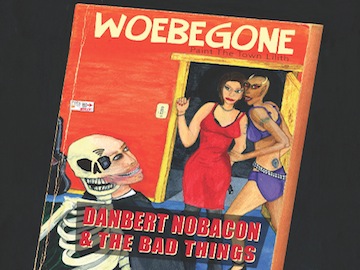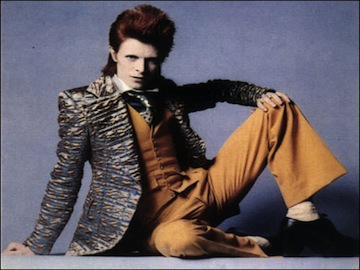OUR TWINS JUST recently became teenagers and today I turned 51 but I am still punk as fuck. I can prove it. Empirically! Oh! Oh! Science and music? Don’t go there. But it’s my birthday … so I can write about whatever I like, right? Like Music? Like the essence of music means making out and stuff? Mmm! Mmm! Baby! Baby! Baby! But is that how it all got started?
So, indulge my birthday privileges, if you will, with this long preamble as a testament to the joy of discovering things in the deepest corners of the subconscious, by the most roundabout and circuitous fashion and how, in so doing, life sometimes proves to be stranger than fiction.
So I have this song from a few years back, which I still have not recorded but will one day. I sometimes play it live, and it is called “Cabaret Hell.” It is a story set in the 2030’s, so it is a fiction, but it comes from somewhere, right? The protagonist, a travelling musician called Johnny Woebegone, has lost part of his memory some years earlier in a bomb blast in New York. He is tormented by half memories. He remembers places but not people. He hears some of the old recordings he made before losing his memory but does not recognize himself. To add to his woe, he is unknowingly the subject of a government experiment in the new technology of ‘implants’ —a small device secretly inserted behind his left eye, which allows him to be monitored during his waking hours. They know where he is; they can hear his thoughts when he expresses them out loud; they can see what he sees. The technology raises a lot of ethical questions, which is why it has to be kept secret.
Johnny intuitively knows without knowing that something strange is going on, something beyond the memory loss caused by the explosion. It is like he can almost hear voices in his head. And he is right. The technology is two-way. His minders can suggest things to him, and at one point, because Woebegone has a never-before-seen knack of sometimes being able to block the implant, they experiment with all kinds of crazy stuff on him, in an effort to get him to open up, including playing some of his old songs directly into his head while sleeping as a form of dream torture.
So in the song Johnny wakes up in this room, surrounded by people having fun, and he cannot remember how he got there. This once kind of happened to me, though I do remember how I got there. Chumbawamba was on our first West Coast tour in 1990. Having played an illegal gig disguised as a birthday party in Las Vegas, where the gang member running things refused to pay us, and rival gangs had cruised by waving guns in the air, we set off into the night, anxious to put distance between us and this particular sin city. Taking turns, we drove through the early morning hours and all through the next day to get to sound-check at Klub Kommotion in the San Francisco Mission District by late afternoon. A pre-Disposable Heroes of Hypocrisy, pre-Spearhead Micheal Franti, as well as local band The Bedlam Rovers, were also on the bill. After our sound-check I promptly sat down on one of the couches in the main room there and fell into deep sleep. When I woke up the room was nearly full and the gig was starting. There were three other people on the couch with me drinking whiskey, including a German girl Michaela who I ended up meeting for breakfast the next day. We just reconnected recently on Facebook.
Anyway Johnny wakes up in this place called The Mystery Motel. In Leeds they used to have this cabaret show called Cabaret Heaven. It was like a Leeds version of Portland, OR—a little bit circus, a little bit comedy, kind of old fashioned live entertainment with a modern twist, and it was a great social event. So if there is a Cabaret Heaven there must be a Cabaret Hell right? And hell rhymes with motel, so Johnny wakes up and well … Cabaret Hell is in full swing all around him at The Mystery Motel. It doesn’t make much sense. Who has ever seen any live entertainment in a motel setting, let alone a cabaret? Providing entertainment, like providing anything resembling real food for breakfast, is superfluous to the mission of a motel … but it’s the future, so anything can happen. And it did.
A couple of years after moving to Twisp, WA, I got asked to do a radio show, on local community radio KTRT 97.5 The Root—don’t look for it unless you are in North Central WA…it is not streamed yet. Anyway, a few days before I first went on air with it I had to think of a name for the show. For some unknown or forgotten reason I came up with The Mystery Motel, or perhaps like Chandler recycling some of his short stories into major plotlines in his Marlowe novels, I thought there was still some life in the idea.
Setting a radio show in the reception of a motel I thought had great potential. You could have musicians and bands passing through staying at the motel and I could play songs by them. The mystery part could be that some of the guests were dead, but they live on, appearing as ghosts … and during the 2010 football World Cup (the kind of football where the game rests on the ball being kicked by the foot) Bill Monroe did play goal in a penalty shoot-out in the motel foyer.
From the very first show, it evolved in a direction that I had never originally envisioned. It is a music show, so I get to play from my diverse —and highly unusual for North Central WA— CD collection, but it also very quickly came to be about the trials and tribulations of the motel staff. I am the host of the show, and my colleague, Mister Edward Zargasterley Jones, is the resident expert on the history of recorded music. He loves talking about the stories behind the songs and setting impromptu musical trivia quizzes. He is a refined English gentleman in a Vivian Stanshall kind of way: not of this world, but not apart from it; not living, but not quite dead. Indeed Mister Zargasterley epitomizes the mystery dimension of the motel, theorizing that music is made up of dark atoms.
Sound is so weird … the atoms in the air vibrating … so why not have it in a weird setting? The Motel itself has some of this strangeness. Like Doctor Who’s Tardis, the Motel can travel through time, to the time before motels were invented, to the future time when motels have ceased to have any practical value, but such time shifts are a rare occurrence, happening only once in a generation, if that. Hence The Mystery Motel’s current location is “somewhere between The Blues Ranch and Mazama, WA.” And being in Washington state, WA is synonymous with the WA in wawa peddle, of course.
As the show developed two other characters made up the regular core staff. Phil the caretaker (janitor), is a mister fix-it, who is always having to fix things, because things frequently go wrong. Microphones, play-lists, fixtures and fittings in the motel, the virtual phones, the aerial on the roof, too much snow. He deals with it all, including cooking the turkey for the Christmas special. He is brash, forthright, very Manchester, and does not hold back when some band has stayed at The Motel and left their rooms in a mess, which he then had to tidy up.
The fourth regular to come on board was Maxine Watson, initially an astronomer, who then got her dream job as an evolutionary biologist. She is intelligent, witty and smoking hot in a scientist kind of way, and there is an understated, unrequited chemistry going on between her and Mister Nobacon. Other fellow travellers and freakazoids include Probber “Brother” Lee, the High Priest of Scientific Probability; Marcel Nobacon from the French side of the No-Back-Ohn family who loves coming to the Methow Valley in winter to skate ski; and Johnny Watson, Maxine’s wheeler-dealing annoying younger brother. Johnny Woebegone, pre-bomb blast, has even been known to stop by and play a song. Talk radio, live performance and anything from punk rock to St Petersburg Balalaika Ensemble, all from the motel foyer. See, I told you I was still punk. I play all the characters.
Anyway, to cut a long pre-amble short, Maxine in the course of her day job and studies, has developed a theory (or at least she and I thought she originated it) that rock ‘n’ roll had its real roots in our hunter gatherer past e.g.
Exhibit A. Wild man of rock: Iggy Pop.
Exhibit B. Rocking orgasmic pro-creationary howl woman: P.J. Harvey.
Exhibit C. Earth mothers who originated human language by cooing to their babies: The Be Good Tanyas.
Exhibit D. Reincarnated visionary shaman: David Bowie.
We probably know that rock ‘n’ roll was a term invented in the juke joints of the South long before Elvis came on the scene, and it means ‘to fuck.’ “Robert Farris Thompson, America’s most prominent historian of African art, says that funky is derived from the Ki-Kongo lu-fuki, meaning “positive sweat” of the sort you get from dancing or having sex, but not working. One’s mojo, which has to be “working” to attract a lover, is Ki-Kongo for “soul.” Boogie comes from mbugi, meaning “devilishly good.” And both jazz and jism likely derive from dinza, the Ki–Kongo word for “to ejaculate.” (cited in Sex At Dawn by Christopher Ryan and Cacilda Jethá – 2010)
Those Bakongoans got it going on, and it seems like Maxine might be on to something. So on the show she waxes lyrical about all this and more, citing the growl and snarl, the purr and the moan, as things that take us all the way back to the dawn of human consciousness. That the thing in music which sends the chill up and down our spines connects us to common shared human emotion and experience, which was first expressed by our ancestors at least a couple of hundred thousand years ago around the campfire. And, like all students writing their final paper, Maxine knows it will take her years to finish it, frequently lamenting the obstacles posed by the complete lack of evidence for any of this in the fossil record.
Imagine my surprise ,then, in recent weeks to discover that real scientists have in recent years begun to study this very stuff. There is a highly serious ongoing chicken or the egg discussion discussion regarding which evolved first, the music or language. Famously, Steven Pinker dismissed the evolution of music as a “spandrel,” as “auditory cheesecake,” meaning it evolved as a by-product of language rather than for any adaptive function in its own right. Many disagree.
Darwin himself intuitively reasoned in The Descent of Man and Selection in Relation to Sex (1890) that music may have evolved from the rhythms and tones of our primate ancestors “for the sake of charming the opposite sex,” as an adaptive form of communication; that it was a proto-language, which was later replaced by language as the major means of communication. Singing as we would recognize it is actually quite limited among non-human primates, occurring most spectacularly in various species of gibbon. The great apes seem to need only parts of song or phrases, to communicate their needs, and these seem to be more of the ‘distance-controlling’ ilk, rather than soliciting or advertising sexual availability.
Many scientists today agree with the music before language hypothesis for homo sapiens, but not so much that it evolved as a rock ’n’ roll cry to make out and fuck. But, if music did come first then according to Michael S. Gazzaniga in Human — The Science Behind What Makes Your Brain Unique (2008) “music now is a “fossil” of a former adaptation…put(ting) music in a subtle category of former adaptations having a biologically grounded cognitive domain that are currently being used not as originally selected for but not in a completely different manner either.”
We know today that the most basic function of music remains as a form of communication expressing emotion in some way. If it is our kind of music, and we connect with it; if it touches our emotions and/or makes us wanna rock out; we are not mistaken in feeling a natural high. Science has proven that the right music for us enhances our mood, not least by making our brains secrete a natural opioid. Music can also make us sad, tense, even scared. Music makes us want to move, tap our fingers and dance. It connects us as a group, it accompanies our rituals and even long before the advent of recorded music, it was in some way a soundtrack to our lives. These are all creative departures which have grown out of the original discovery of making music by our ancestors, and their recognition of its power to communicate some kind of feeling or emotion to the listener, to connect us, but what triggered our potential for music in the first instance?
It is safe to say we would not have music or language, had our ancestors not begun to walk upright and had their brains not begun to grow, which over long evolutionary time catalyzed a whole suite of new ways of being that were crucial to our survival. Once we walked upright and became fully bipedal, we no longer slept in trees but on the ground, which meant that along with all the usual survival pressures, the group needed a greater level of social cohesiveness, requiring better communication.
In parallel, the loss of an opposable big toe that was good for climbing, in favor of a forward facing toe that was good for walking and running, also meant babies could no longer cling to momma, as chimp babies do, and as a biped momma was losing her body hair for baby to cling to. One plausible suggestion is that musical tones evolved beyond the level of our primate cousins as a means for a mother to put her helpless bigger-brained human baby down. There would have come a point where mothers would have to put baby down on the ground whilst they used both hands to go gather some berries or dig up some tubers. And, as any music teacher will tell you, an upright posture also enhances vocal ability.
Making sure baby was not whisked off by predators, whilst gathering the food to enable baby to thrive and grow and eventually pass on its genes, was adaptive. A sing song communication assured baby that mother was close by, even though baby could not necessarily see her. Mmm! Mmm! Baby! Baby! Baby! And whatever random genetic mutations prompted this survival strategy, that it proved successful, meant that those who were musical survived better than those who were not, and so music became part of human nature.
The subsequent cultural evolution of a more sophisticated turn-taking, sing-song communication, known as motherese, which as Dean Falk points out in Finding Our Tongues (2009) has been described as both “spoken music” and “musical speech,” takes us at least part way to fully fledged language. That we all instinctively switch to motherese today when engaging in two-way communication with babies, long before they have any grasp of formal language, suggests music has made some contribution to the evolution of language. Arguably infant-directed songs still hold the attention of younger babies even better than motherese does?
We also respond to music by wanting to move or dance, and as Steven Mithen points out in The Singing Neanderthal – The Origins of Music, Language, Mind and Body (2006): “rhythm, sometimes described as the most central feature of music, is essential to efficient walking, running and, indeed any complex coordination of our peculiar bipedal bodies.” It follows then that the pre-existing requirements for the complex vocalizations and the development of the human capacity for music and language go back at least a couple of million years to Homo Ergaster, the first fully fledged biped. That said, until our ancestors headed out of Africa around 50,000 years ago, there is little evidence for humans having the separate music and language capabilities that we recognize today. And so far, the first precisely manufactured musical instruments only began showing up in the archeological record 36,000 years ago.
Whilst none of the debates on the origins of music and language are in any way resolved, it seems that Maxine Watson’s attempt to trace the specific origins of our ability to rock out, currently is more reliably rooted in the cultural explosion that was The Great Leap Forward rather than the deeper history of homo sapiens.
Mithen, who freely admits to ‘not being musical’, nevertheless believes we all have an innate sense of music which goes beyond cultural norms of who is, or isn’t, musical. Even if, as is often the case here in the West, our culture often teaches us not to be musical, then we retain a sense of what we like in music and what moves us that is not merely learned. Having studied music in culture all around the world, In How Musical is Man? (1973) John Blacking suggests that, “what is ultimately most important in music cannot be learned like other cultural skills; it is there in the body, waiting to be brought out and developed, like the basic principles of language.”
This certainly seemed to work for me, who first discovered music for myself, in the British Glam Rock of the early 70’s, but never dreamed I could express myself musically until a few years later, as a sixteen-year-old, when I had experienced punk rock hitting the smaller towns of northern England in 1978. And, I would never have guessed that 35 years later I would have the desire to examine the evolutionary origins of our urge to rock.
Maxine doesn’t know it yet —but Mister Zargasterley might— that the term darwinpunk which she coined for her thesis as a scientific modeling tool, would in the 2020’s and beyond, pass into popular usage to describe a whole sub-genre of music and culture. As with any label it’s popular usage was not always accurate, but it did acknowledge a cultural moment in the new renaissance where science and art got horny and made out some.
“… from old-time darwinpunk riffs to the strains of future country, Woebegone snarls his way through songs of oil, sex and death like a demented Cyclops on Zolprax … bone-tingling, quim quivering and guaranteed to burn…”
— Blurbnote January 2032, quoted on the sleevenotes to the re-issue of Woebegone







As a student of linguistics, I LOVE this. Fantastic. Rock on, Danbert!